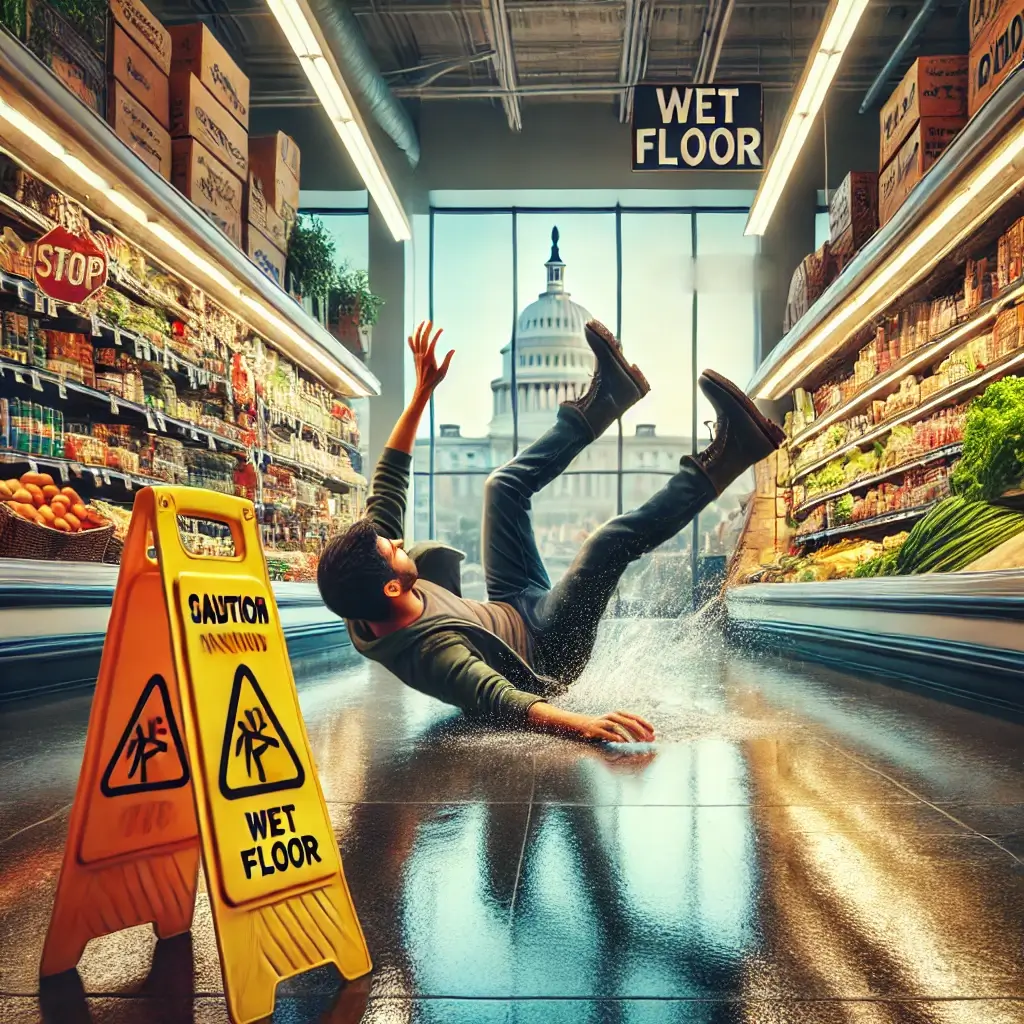DC Grocery Store Injury Lawyer
Customers expect a safe shopping experience when they enter a grocery store. You may be in a rush to prepare a last-minute dinner for family or friends. You may need to get your groceries for the week, or you may require a lot of items. Whatever the case, you are not accounting for hazards that threaten your health and safety when you arrive at the grocery store. And yet, accidents happen daily. As DC grocery store injury lawyers, we know how many hazards can present at grocery stores. When you imagine a grocery store injury, the first thing that comes to mind may be slippery floors and spills. Unquestionably, that is the most common type of injury we see at grocery stores. However, as we will discuss, negligence presents itself in many forms.
Given that the grocery stores in Washington, D.C., are in an urban environment, you are less likely to see parking lot incidents. Instead, you will see higher foot traffic as downtown DC is more densely populated than the surrounding suburbs. With higher foot traffic, dangerous conditions are likely to be created. We will discuss the legal duty of a grocery store in more detail below. But in general, the more people that frequently traffic the grocery store, the more staff the grocery store should have to ensure safe premises for all business invitees. By understanding the common causes of grocery store injuries and your legal rights if you are injured, you will be better prepared to take your first steps toward compensation.
Don’t navigate the complexities of a grocery store injury case alone. Reach out to a seasoned DC grocery store injury lawyer today to discuss your options and get the support you need.
Common Causes of Grocery Store Injuries
The legal duty of a grocery store is one that any invitor owes to its business invitees. First, an invitee is a person who enters the premises in response to an express or implied invitation from the landowner. This is a significant bit to note. The implied invitation you get from a grocery store is to go inside and shop for items they sell. The scope of the implied invitation does not extend to you going to the back of the store where it is marked “employees only.”
The grocery store’s duty to the shopper is for the employees to use reasonable and ordinary care to keep the property safe. This duty includes warning the grocery store of or making safe, nonobvious, dangerous conditions known to it. You may wonder, can’t the grocery store plead ignorance? A second duty is to make reasonable inspections to discover unsafe conditions. The more foot traffic in the store, the more frequently the grocery store should inspect for hazardous conditions. Note that there is no duty to warn if the hazard is obvious. Additionally, the store must use ordinary care in active operations on the property.
Slippery Floors and Spills

Slippery floors and spills are the most common cause of grocery store injuries. These injuries are not as high-impact as a car or bicycle accident. However, if you are an older adult and you fall, you can be seriously injured. In our 70 years of practice, our DC grocery store injury lawyers have handled accidents where clients fractured hips, noses, wrists, and more due to a slippery floor and spill. The question in these cases is whether the grocery store knew or should have known of the spill. We can determine if the grocery store employees learned of the spill if they tell you something immediately after the fall.
For example, we have had cases where a grocery store employee says to our client, “I was just coming over to clean that spill up.” That statement from the employee indicates the store was aware of the hazard and did not act quickly enough to protect the invitees in the store. There are other instances, such as when the warning sign that the grocery store places by the hazard is not actually in the victim’s view. For example, if you are coming up an aisle and the slippery floor sign is around the corner, you may not be sufficiently warned, and the grocery store’s liability would not be absolved.
Obstructions and Aisle Clutter
These are trickier cases than slippery floor cases. For a slick floor, the dangerous condition may not be apparent. The yellow warning sign makes the hazardous condition obvious and absolves liability. When there is an obstruction on the grocery store floor or aisle clutter, it may be apparent. Or, you may be contributorily negligent in injuring yourself. You are barred from recovery if you are found even 1% negligent in causing your injury. However, obstruction and aisle clutter still lead to a viable negligence claim against the grocery store. In DC, space is at a premium. The impact of such clutter can be hazardous.
Aisle clutter can come from various sources. This clutter can be dangerous. Below are some common examples.
- Overstocking shelves or piles can lead to things tipping over and falling on customers. Our DC grocery store injury lawyers have successfully handled dozens of cases involving piles of goods tipping over and falling on customers. The key to winning this case is that you or anyone else did not touch the pile before it tipped over and fell on you, injuring you.
- Improperly placed displays. Improperly placed displays can make maneuvering through aisles difficult. This is especially problematic for those with mobility issues. However, you risk facing a contributory negligence defense, a complete defense in Washington, DC.
- Equipment in aisles. Equipment in aisles can present a dangerous condition and a clear obstruction of your path.
Parking Lot Incidents
If the grocery store owns the parking lot, you may be able to make a claim against the grocery store. You may also be able to make a claim against another driver, pedestrian, or trucker if their negligence injures you.
What to Do if You Are Injured in a Grocery Store
The first thing to do is ensure your health and safety. If your injuries are life-threatening, contact paramedics and rush to the emergency room. If your injuries are not as severe, look to file an incident report at the grocery store. This will create further records of the injury that occurred. If any employees said anything to you about your injury, get their name. Also, note the time of the injury and where it happened in the store. Take photographs of anything relevant to the accident. For example, take a photo of the spill if you are injured on a slippery surface. If there is a warning sign, take a video showing your path and how it was not in your sight when you fell.
How Grocery Stores Should Prevent Hazards
There are several things grocery stores must do to prevent hazards. If they fail to take these reasonable steps, they could be liable for injuries that ensue due to their failure to act. The basis of negligence is rooted either in negligent or careless acts or in an omission to act. These acts are relevant to whether they are taking reasonable steps to provide safe premises for customers. One of the primary duties is maintaining clean and clear walkways, which means spills must be cleaned up promptly, and warning signs should be placed immediately if the floor is wet or dangerous. But what does this mean? Must grocery store employees know of a spill on the floor within one second of it happening? That places an unreasonable burden on businesses. Instead, the law imposes a duty to conduct regular inspections to catch potential hazards before they result in an accident.
Conduct Frequent Floor Inspections
No one expects grocery stores to become immediately aware of hazardous conditions in their store. While it is not too much to ask for a grocery store to monitor each aisle via security cameras, the law does not currently impose that civil duty. Thus, they are required to inspect for dangerous conditions on a reasonable basis. A couple of notes on what constitutes a reasonable basis. Firstly, this is a jury question. This means what is considered reasonable to one jury may differ from what the next jury considers reasonable. Although, expert witness testimony should maintain a somewhat consistent idea of what is reasonable. Secondly, the reasonable basis varies depending on the store, store size, how busy it is on average during that time of day, and whether they already know that a machine tends to break down.
Floors can quickly become hazardous due to spilled liquids, dropped items, or debris tracked in from outside, especially in high-traffic areas such as produce sections, entrances, and checkout aisles. Store employees should be assigned to inspect these areas on a schedule, with specific attention to busier times of day when the likelihood of spills increases.
Address Spills and Leaks Immediately

What if, during the inspection, a grocery store employee comes across a dangerous condition? One may argue that they can immediately warn customers of the hazard by placing a wet-floor sign or cone on the ground. This does absolve a grocery store of liability in most cases. On the other hand, if the store employee forgot to bring a sign with him on his inspection or decides to go back to the storage room to grab supplies to clean the hazard and someone slips, the store is probably at fault. Additionally, if a customer notifies a store employee of a dangerous condition like a spill or something sticking out of a shelf, they are officially on notice. This implies a legal duty to address the hazard immediately.
The employee then must act immediately. A failure to do so that results in an injury can lead to liability. To act as quickly as possible, every store should have easily accessible spill kits. These include absorbent materials, mops, and safety signage to address hazards quickly.
Properly Maintain Equipment
Equipment such as floor scrubbers, pallet jacks, and refrigeration units should be regularly inspected to ensure safe operation. If not properly maintained, these can lead to worker’s compensation and personal injury claims with help from a DC grocery store injury lawyer. Similar to inspecting aisles, employees should inspect and schedule inspections for equipment. Equipment left in aisles, such as carts or stocking tools, can obstruct pathways and cause trips. Employees should never leave equipment unattended in customer areas.
Another scenario our DC grocery store injury lawyers frequently encounter is refrigerators and freezers that leak onto the floor. This can create slippery conditions. Regular maintenance and inspections of cooling units are essential to prevent leaks. Grocery stores should understand and adhere to this rule. Of course, if we litigate this case, we must hire an expert witness to testify at trial about how frequently a cooling unit, refrigerator, or freezer must be maintained.
Ensure Adequate Staffing
Having enough staff on hand is crucial for maintaining a safe environment in a grocery store. With proper staffing, stores can ensure that tasks like cleaning up spills, monitoring aisles for hazards, and assisting customers are completed on time. The amount of staff needed depends on the number of customers inside the grocery store. A grocery store should be able to anticipate what times tend to be busiest. Without sufficient staff, the store may be unable to keep up with cleanings, inspections, rapid responses to hazards, and crowd management. For example, if there is insufficient staff and the line to check out grows longer and longer, this may create a hazard.
Correctly Secure Displays
Our DC grocery store injury lawyers routinely handle cases involving incorrectly secured displays. However, proving that this is how the injury occurred can be challenging without an eyewitness or security footage. Whether it’s a stack of promotional goods or shelving units holding heavy products, stores must ensure that displays are stable and won’t tip over or obstruct customer walkways. If they do tip over and hit a customer, causing injury, you may have a claim against the store for negligence.
Steps to Take After a Slip and Fall in a Grocery Store
- Check for Injuries and Seek Medical Attention: Even if you feel okay, it is important to seek medical attention, as some injuries, such as concussions or internal injuries, may not be immediately apparent. Call 911 or ask someone nearby for help if you need immediate assistance.
- Report the Incident: Notify store management or an employee immediately. They should file an incident report detailing the accident. Be sure to request a copy of this report or note the employees’ names. This creates a record of the incident. In the typical car accident case, the property damage to the vehicle is enough to show you were in an accident. For a grocery store injury, we need more.
- Document the Scene: Use your phone to take photos of where the fall occurred. Capture images of any hazards, such as spills, debris, or obstructions that caused the slip. Take a video to show your perspective and the surrounding environment, especially if any warning signs are missing or not visible. Even if a sign is visible, show how it may not have been apparent from the angel you walked in from.
- Gather Witness Information: Ask for their contact details if anyone saw the fall. Witnesses can provide crucial third-party accounts that support your version of events, which could be valuable if the grocery store disputes your claim.
- Avoid Making Statements: Be cautious about what you say immediately following the incident. Avoid saying things like “I’m fine” or apologizing, as these statements could later be used against you to suggest that the fall was not serious or was your fault. This is critical because we often do not know how hurt we are immediately after the injury due to adrenaline.
- Seek Legal Counsel: Contact an experienced DC grocery store injury lawyer immediately.
Contact an Attorney
Our DC grocery store injury lawyers have handled supermarket injury cases for 70 years. In our practice, the law has mostly stayed the same. Fortunately, the ability of victims to document evidence with their smartphones has only improved. If you are injured at a supermarket, contact Gelb & Gelb today for a free consultation.

 N/a
N/a















